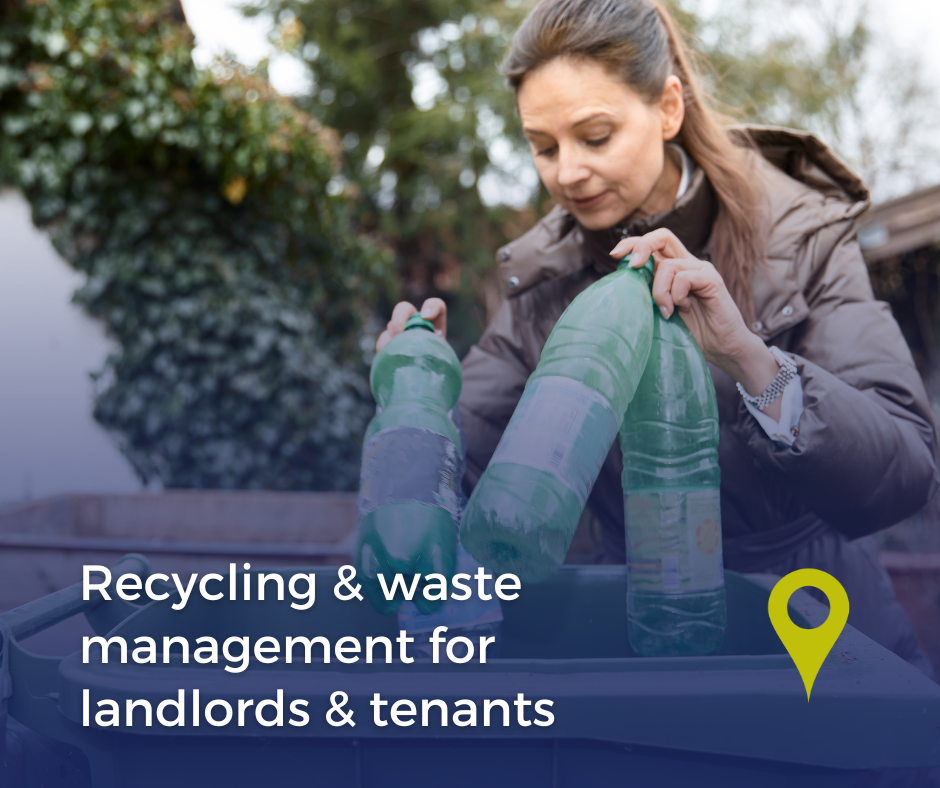Recycling & waste management for landlords & tenants
On the 6th April 2024, the Welsh Government introduced new laws on recycling and waste management.
Under these new laws, tenants, landlords, businesses and organisations are responsible for sorting their waste for recycling.
This means separating waste into recyclable categories – which many households do anyway – to reduce landfill usage and increase recycling rates.
This has left both landlords and tenants wondering what exactly they need to do to comply with the law.
Let’s take a closer look at waste management responsibilities in general, as well as what the new law means for you.
Landlord responsibilities
If you’re a landlord, here’s what you need to do:
1. Dispose of commercial waste
Landlord’s are only responsible for disposing of commercial waste.
This means waste created by you or someone acting on behalf of you, like a contractor doing maintenance work, for example.
Hiring a skip is normally the best way to get rid of waste from construction work, like soil and rubble, but in light of the new laws, it’s important to keep recycling in mind.
This means separating recyclable items like wood, metals, rubble and plastics from general waste.
Some skip hire services offer recycling options to make this easier for you.
Note that items like electrical equipment, hazardous materials, liquids and mattresses can’t go in a skip.
2. When household waste becomes commercial waste
Tenants are generally responsible for disposing of their own household waste.
Although, when tenants move out, any waste left behind becomes commercial waste, which is your responsibility.
It’s especially important to be aware of any waste or bulky items left outdoors or on the street, as this could result in a hefty fine.
Again, any waste left behind for you to deal with needs to be sorted for recycling in line with the new laws.
3. Provide bins & ways to dispose of waste
Under a HMO licence, tenants are ultimately responsible for their own waste, but landlords are required to provide bins.
You also have to tell tenants how to dispose of waste properly, what the recycling requirements are and when bins are collected.
4. Protect yourself from waste crime
As the landlord, it’s your responsibility to make sure tenants follow government legislation relating to waste management.
If there are certain types of waste kept on your property for a long time, you can be prosecuted for it, even if you didn’t put it there.
According to National Resources Wales, as a landlord you will have no defence if you claim you didn’t know waste activity was illegal, but you knew it was taking place and allowed it to continue.
4. Educate tenants
Landlords need to educate tenants about the importance of recycling and how to properly separate waste.
If you have good communication with your tenants or a reputable property manager, this should be easy.
5. Reporting requirements
Landlords may be required to submit reports on their recycling efforts to local authorities.
This could include details about recycling rates, types of materials recycled, and any challenges faced.
Tenant responsibilities
If you’re a tenant wondering how the new law affects you, here are some facts and responsibilities to be aware of.
1. Household waste
While the landlord is legally responsible for providing bins and ensuring you recycle properly, tenants are responsible for disposing of their own waste.
Your landlord and local council should tell you about bin collection days, what can be and can’t be recycled and what counts as general waste.
If you’re unsure about anything, you can contact your local council or speak to your landlord.
2. Disposing of bulky items
You’re responsible for disposing of any bulky items, like a fridge or sofa, while living at a rented property.
You can typically contact the council and have them collect things like this free of charge.
3. Store waste responsibly
Tenants should secure waste safely and securely off the street, unless it’s a waste collection or bin day and follow the guidelines provided by the local council and landlord information.
When it comes to storing waste, you must ensure it’s stored safely and securely off the street.
However, you can leave items on the street if it’s a bin collection day or you’ve arranged for the items to be picked up.
Always follow the local councils guidelines and your landlord’s advice when it comes to storing waste properly.
Wrap up
Under the new recycling and waste management laws, both landlords and tenants have a role to play.
Landlords must deal with commercial waste responsibly, provide bins in HMOs, and educate tenants about their responsibilities.
Tenants must deal with their own household waste, including disposal and safe storage.
If you need any more guidance about meeting waste management standards, you can reach out to a member of the team here.
We keep our landlords compliant and help make waste management simple and efficient.

